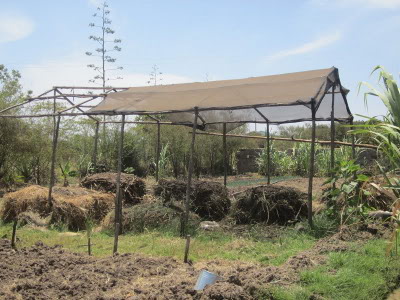
Grow Biointensive compost
 The chapter in Grow
More Vegetables that
held up best to scientific scrutiny covered compost. Jeavons'
compost pile is very different from many I've seen because he
incorporates a lot of soil and keeps the C:N ratio quite high (44:1) as
a way of maximizing humus creation rather than minimizing cooking
time. This is where a lot of the grain
leaves and stems from his garden end up, along with kitchen waste,
twigs, and small branches, and the lignin in the woodier materials
tends to create more humus in the final product. While Grow
Biointensive piles take four months or more to fully cure, the organic
matter they produce also lasts much longer in the soil.
The chapter in Grow
More Vegetables that
held up best to scientific scrutiny covered compost. Jeavons'
compost pile is very different from many I've seen because he
incorporates a lot of soil and keeps the C:N ratio quite high (44:1) as
a way of maximizing humus creation rather than minimizing cooking
time. This is where a lot of the grain
leaves and stems from his garden end up, along with kitchen waste,
twigs, and small branches, and the lignin in the woodier materials
tends to create more humus in the final product. While Grow
Biointensive piles take four months or more to fully cure, the organic
matter they produce also lasts much longer in the soil.
Intriguing, but less
scientifically supported, compost facts in Jeavon's book include a
qualitative analysis of compost types. He asserts that compost
made from plants is four times better than that made from manure, and
that roots rotting directly in the soil are twice as good as plant
compost. With no extra information or citation, I'm left guessing
that maybe Jeavons means plant roots rotting directly into the soil are
most likely to turn directly into humus, but I'd be curious to hear
from anyone with more information.
| This post is part of our How to Grow More Vegetables lunchtime series.
Read all of the entries: |
Want more in-depth information? Browse through our books.
Or explore more posts by date or by subject.
About us: Anna Hess and Mark Hamilton spent over a decade living self-sufficiently in the mountains of Virginia before moving north to start over from scratch in the foothills of Ohio. They've experimented with permaculture, no-till gardening, trailersteading, home-based microbusinesses and much more, writing about their adventures in both blogs and books.
Want to be notified when new comments are posted on this page? Click on the RSS button after you add a comment to subscribe to the comment feed, or simply check the box beside "email replies to me" while writing your comment.

I tend to agree with letting organic matter decay in the soil you want to improve. Most composting guides suggest adding a shovel or two as an accelerator to add micro-organisms. If a little is good a lot must be better. Why mix and turn several times before moving to the garden. I like to add 2-3 inches of leaves mixed in 8-10 inches then add 1-2 inches of manure to the top 4-6 inches for plants to use the N. I have found this breaks up the clay soil rather quick and allows good growth. Grass clippings used as mulch get turned under at the end of season to rot in place. As the beard gets greyer and the gardened larger you really appreciate skipping as may backbreaking steps as possible. Nature doesn't worry about C/N ratios or how long to composting takes, why should we. I have studied many gardening methods and they all seem to work; many to the point of being "the only way" to prevent world hunger. I prefer to take bits and pieces from each to meet my own personal goals. One day I hope to try the "Anna Do Nothing Method" of cover cropping. Who know it may soon be the only way for this to work? Either way thanks for all you do.